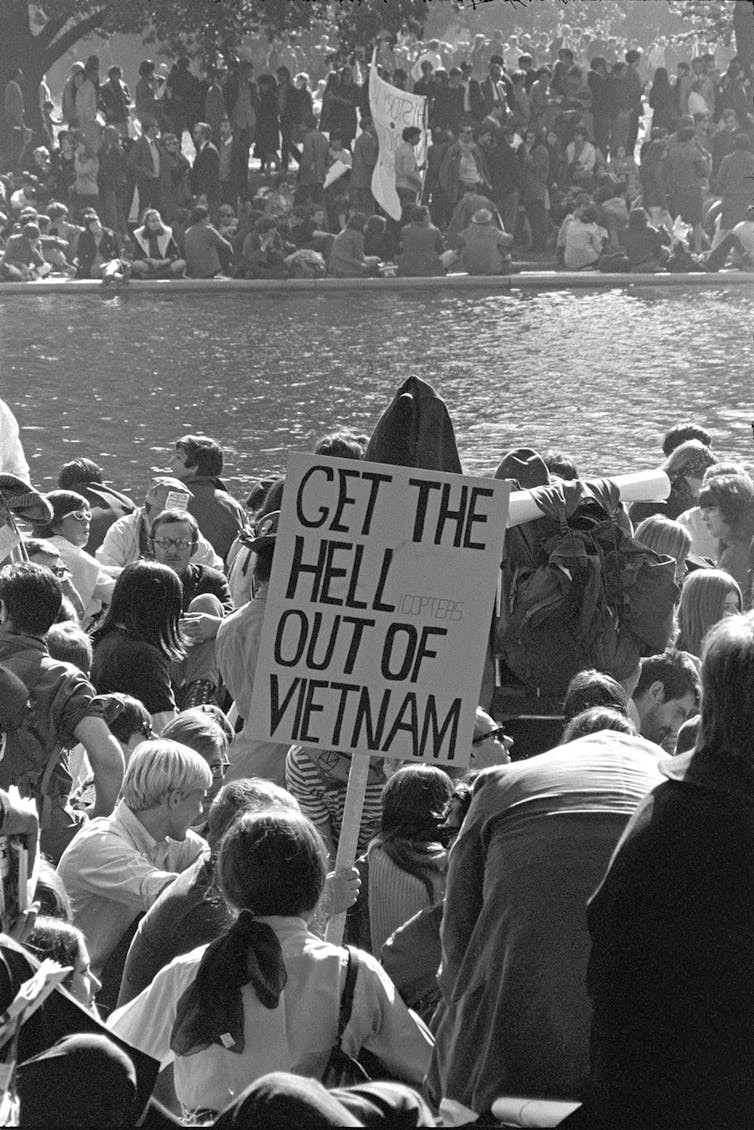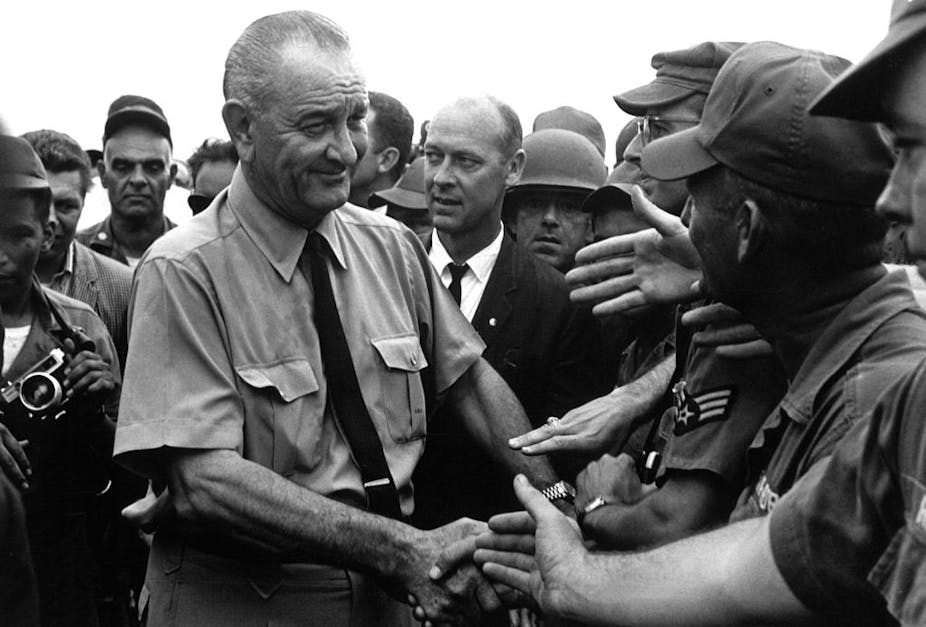Fifty years ago, during the first six months of 1965, Lyndon Johnson made the decision to Americanize the conflict in Vietnam.
His vice-president, Hubert Humphrey advised him against it. So did his long time mentor and friend, Senator Richard Russell of Georgia. Inside the administration, Undersecretary of State George Ball also made the case for restraint.
The war, they said, would have to be limited in scope. The job, therefore, couldn’t be finished which would mean an open-ended commitment.
Communist China made it clear that it would not permit an invasion of North Vietnam. For fear of provoking an all-out war with the communist superpowers, the Johnson administration would forswear not only an invasion but also any attempts to sponsor an anti-communist insurgency in the North.
The state of South Vietnam was in many ways artificial. Instead of a nation with a unique history, South Vietnam was a political compromise, the creation of the Great Powers (the US, the Soviet Union, China, France and the United Kingdom) at the 1954 Geneva Conference.
The flag of Vietnamese nationalism had been captured by the Communist leader Ho Chi Minh and his followers in the north: it would not be easily wrested from them.
Indeed, George Ball predicted that the United States would eventually have to put half a million troops in Vietnam, a prediction which Secretary of Defense Robert McNamara vehemently rejected.
During the intense debated that occurred within the foreign policy establishment in the spring and summer of 1965, Johnson himself was frequently the leading dove.
In conversation with Dick Russell, he said,
“I don’t think the people of the country know much about Vietnam and I think they care a hell of lot less.”
Shortly after, he vented to adviser McGeorge Bundy in a now familiar monologue:
“I don’t think it’s [South Vietnam] worth fighting for and I don’t think that we can get out. It’s just the biggest damned mess that I saw…What the hell is Vietnam worth to me?…What is it worth to this country? …this is…a terrible thing that we’re getting ready to do…”
But in February 1965 Johnson approved Operation Rolling Thunder, the aerial assault on North Vietnam. And in July he agreed to the dispatch of two combat divisions to Vietnam.
Why?
Containing communism
In April 1964 US intelligence reported that substantial numbers of regular North Vietnamese troops were infiltrating into South Vietnam via the Ho Chi Minh Trail.
The CIA predicted that if Washington and its allies did not act, South Vietnam would fall within the year. American intelligence and Foreign Service operatives on the ground began requesting new assignments.
Johnson believed that if he permitted South Vietnam to fall through a conventional North Vietnamese invasion, the whole containment edifice so carefully constructed since World War II to stop the spread of communism (and the influence of the Soviet Union) would crumble.
There were also domestic considerations.
Negotiating with southerners and living in shadow of JFK
In the spring and summer of 1965 Johnson was laboring to get through Congress some of the most controversial of his Great Society programs: the Voting Rights Act, federal aid to education, and Medicare, among others.
Both the education bills and Medicare were civil rights measures in their own right, making federal funding to schools and hospitals dependent on desegregation.
Johnson, a southerner himself, worked to persuade congressmen and senators from the former Confederacy to acquiesce in, if not actively support, passage of these measures.
The South was both the most segregationist region of the country and the most hawkish on foreign affairs. Johnson believed he could not ask the region to accept both the demise of Jim Crow and the loss of South Vietnam to the communists.
Matters were further complicated by the fact that right-wingers led by FBI Director J Edgar Hoover and Alabama governor George Wallace were trying to portray the civil rights sit-ins and demonstrations as communist inspired.
Furthermore, Johnson was acutely aware that he was JFK’s successor.
The American commitment to South Vietnam was one of Kennedy’s legacies. Johnson saw no evidence that President Kennedy had intended to deescalate. Johnson had chosen to keep on Kennedy’s foreign policy team – McNamara, Bundy, and Secretary of State Dean Rusk. They were unanimous and vehement in their advice to stay the course in Vietnam (although McNamara would very publicly do a mea culpa years later.)
The gamble
LBJ was a nation-builder. The Great Society comprised more than 1,000 pieces of legislation and forever altered the social and political landscape of America.
Johnson was reluctant to intervene in South East Asia but once strategic and politic exigencies seemd to demand it, he began to develop a not unreasonable vision for the future of South Vietnam, one that helped him stay the course. In thinking about Vietnam, the model LBJ had in mind was South Korea.
Here was a nation born under the direst of circumstances. After a devastating war with the North (1950-1953) and one of the lowest living standards in the world in 1950, South Korea had by 1963 emerged from military rule and in 1965 was already beginning to see real economic gains. So why couldn’t South Vietnam follow this model?
The war was, however, impossible to win as Ball and Humphrey had predicted.
Out of fear of a great power confrontation with the Soviet Union, the United States fought a limited war, with the South China Sea to the east and the open borders of Laos and Cambodia to the west.
The Soviets supplied North Vietnam by sea. The North Vietnam Army and the underground Vietcong were free to move in and out of their sanctuaries in Laos and Cambodia. Never during the ten-year-long Second Indochinese war did a government emerge in Saigon worthy of the support of the people of South Vietnam. The regimes that followed in the wake of Ngo Dinh Diem, who was ousted in a coup in 1963, were particularly weak and corrupt.

In the end, Johnson understood.
At a post-retirement dinner in New York with McNamara, Bundy, and other former aides in attendance, LBJ accepted full responsibility. Looking at his former defense chief and national security adviser, he said,
“You know, I want you fellows to know everything that went wrong in Vietnam that’s being criticized, it was my decision, not yours…”
What if Johnson had heeded Humphrey’s advice and his own doubts?
South Vietnam would have fallen to the communists much sooner than it did, saving thousands of American and hundreds of thousands of Vietnamese lives.
But segregationists and red-baiters might well have blocked the civil rights achievements of the Great Society, prompting racial conflict at home that would have made Detroit seem like a picnic.
There are no easy choices when you are chief executive of a nation which is both a democracy and the most powerful nation on earth.

